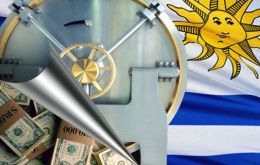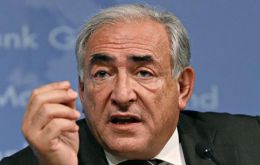MercoPress. South Atlantic News Agency
Tag: IMF
-
Wednesday, January 26th 2011 - 18:43 UTC
International Monetary Fund Expects Global Economy to Grow Faster Than Expected

The International Monetary Fund (IMF) has said that the global economy will grow faster this year than expected.
-
Wednesday, January 26th 2011 - 17:17 UTC
Davos Economic Forum Gets Underway, Adjusting to “New Reality”

Adjusting to the “new reality,” was top of the agenda at the World Economic Forum on Tuesday. Some 2,500 business leaders, politicians and social activists are looking forward, while trying to anticipate unexpected shocks, it was reported.
-
Tuesday, January 25th 2011 - 01:28 UTC
Risk of Latin American Economies Overheating

The International Monetary Fund (IMF) has warned of the risks of inflation and overheating of the economy in Latin America, at a forum held in Paris.
-
Wednesday, January 5th 2011 - 08:34 UTC
A Latin American View: Not Heard At The G-20

International economic coordination is as necessary as it is elusive. During the global financial crisis, the G-20 became the primary forum to agree on basic principles in areas such as the fiscal-policy response and the role of the International Monetary Fund.
-
Friday, December 17th 2010 - 23:04 UTC
IMF anticipates ‘soft-landing’ of Uruguay’s economy in next two years

The International Monetary Fund said economic growth in Uruguay will probably slow over the next two years, requiring policy makers to prepare for a “soft landing.”
-
Thursday, December 16th 2010 - 23:56 UTC
IMF votes aid loan to Ireland, but open to discussions with a new government

The International Monetary Fund (IMF) approved a 22.5 billion Euros loan for Ireland and said it was open to re-negotiating parts of the bailout package with a new government provided its overall targets were adhered to.
-
Thursday, December 16th 2010 - 23:52 UTC
IMF technical support for Argentina Statistics Office will continue until next April

International Monetary Fund (IMF) will continue collaborating with Argentina national statistics bureau, Indec, in order to create “a price index with stronger credibility,” the spokeswoman of the organization, Caroline Atkinson, assured in Washington.
-
Wednesday, December 15th 2010 - 22:30 UTC
Irish parliament approves multi-billon Euro EU/IMF bailout package

Ireland's parliament on Wednesday approved (81 to 75) a multi-billion Euro EU/IMF bailout package in the face of opposition threats to renegotiate the deal to force losses on some senior bondholders in Irish banks.
-
Friday, December 10th 2010 - 18:32 UTC
IMF evaluates the spill-over impact of China’s growth for the rest of the world

Economic data suggest that a 1 percentage point increase in China’s growth rate sustained over five years means an extra 0.4 percentage point of growth for the rest of the world, two experts at the International Monetary Fund said after studying figures for the past two decades.
-
Wednesday, December 8th 2010 - 04:56 UTC
IMF criticizes Europe’s disjointed response to the Euro debt crisis

The head of the International Monetary Fund criticized Europe's disjointed response to the Euro zone debt crisis after Germany and other states resisted his calls for bolder action.
